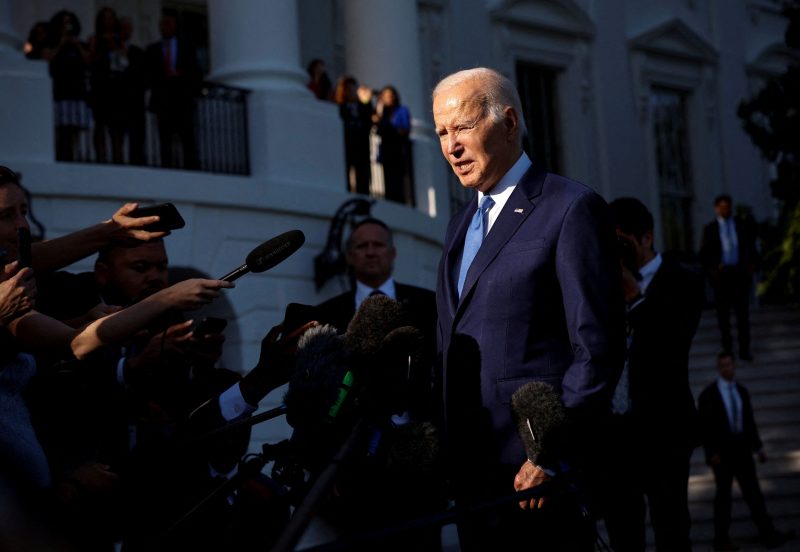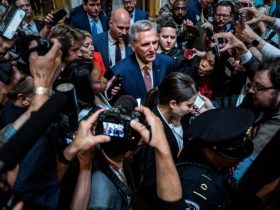President Biden and House Speaker Kevin McCarthy (R-Calif.) are speaking again on Saturday night in frantic pursuit of a long-elusive debt ceiling deal, as Washington confronts the increasingly dire threat of a government default in roughly one week.
The discussions intensified one day after Treasury Secretary Janet L. Yellen offered a more precise update on the fiscal deadline, telling lawmakers they have until June 5 to act before the U.S. government runs out of money to pay its bills. A default could plunge the nation into a recession and set off a global fire sale as investors flee stocks and bonds to accumulate cash.
The two men are set to speak by phone at 6 p.m. Saturday, according to a person familiar with the matter who requested anonymity to describe the private talks. The person also noted that Biden connected with congressional Democratic leaders earlier in the day.
Rep. Patrick T. McHenry (R-N.C.) — one of McCarthy’s top emissaries — acknowledged Saturday evening that “big thorny issues remain” in the way of a compromise. At this point, he said, some of those persistent disputes must be resolved by the president and the House speaker directly.
Earlier, McCarthy reiterated to reporters that he is optimistic about the party’s prospects, noting that he had already been in contact with the White House.
Time remains short for Biden and McCarthy to finalize, craft and advance debt ceiling legislation through the narrowly divided House and Senate, where Democrats and Republicans alike have grown apprehensive and critical about their leaders’ behind-the-scenes efforts.
Privately, the two sides have discussed a deal that could extend the debt ceiling into 2025, along with a freeze on much domestic spending and an increase in defense and veterans funding. Negotiators have eyed delivering on a key GOP priority by clawing back money from the IRS, which had received a budget boost to pursue unpaid federal taxes.
Representatives for Biden and McCarthy still have not resolved a wide array of other Republican demands, including new work requirements targeting the recipients of nutrition assistance and other federal aid programs. But the nature of their talks — and the early contours of their potential deal — increasingly has left conservatives frustrated that they have lost more than they gained.
The powerful far-right House Freedom Caucus has pressed McCarthy in recent days to hold firm to the bill the chamber passed last month, which would couple a short-term increase in the debt ceiling with steep spending cuts and a rollback of Biden’s key policies, including his efforts to cancel college students’ debts and combat climate change.
On Saturday, the block ratcheted up its criticism further, tweeting that the initial reports of the deal are “unacceptable,” while one member — Rep. Dan Bishop (R-N.C.) — predicted it could mean “war.”
“Anything that strays too far from the House-passed bill is going to concern conservatives,” said Rep. Ben Cline (R-Va.), a member of the caucus. He added that any increase in the debt ceiling into 2025 — beyond what the party previously proposed — would require McCarthy to “add items” to the talks.
In an apparent rebuttal to those criticisms, McHenry on Saturday said Republicans faced a “Titanic task” to achieve their agenda in talks with Biden.
Democrats, meanwhile, have sounded their own fears about the compromises Biden might make during his haggling with Republicans, raising worries that any deal with McCarthy might harm American families’ finances. They have taken special exception to the continued GOP push to tie the debt ceiling to new work requirements, which many liberals overwhelmingly oppose.
“The devil’s always in the details,” said Rep. Pramila Jayapal (D-Wash.), the leader of the liberal-leaning Congressional Progressive Caucus, noting that the block has been adamant in its belief that a deal cannot include big cuts that disadvantage working people.
The tensions nonetheless underscore the complicated math facing both Biden and McCarthy, who have acknowledged that any resolution of the debt ceiling standoff is going to require votes from both parties.
Biden late Friday expressed a measure of optimism, telling reporters before he headed to Camp David that a deal is “very close.”
Paul Kane contributed to this report.








